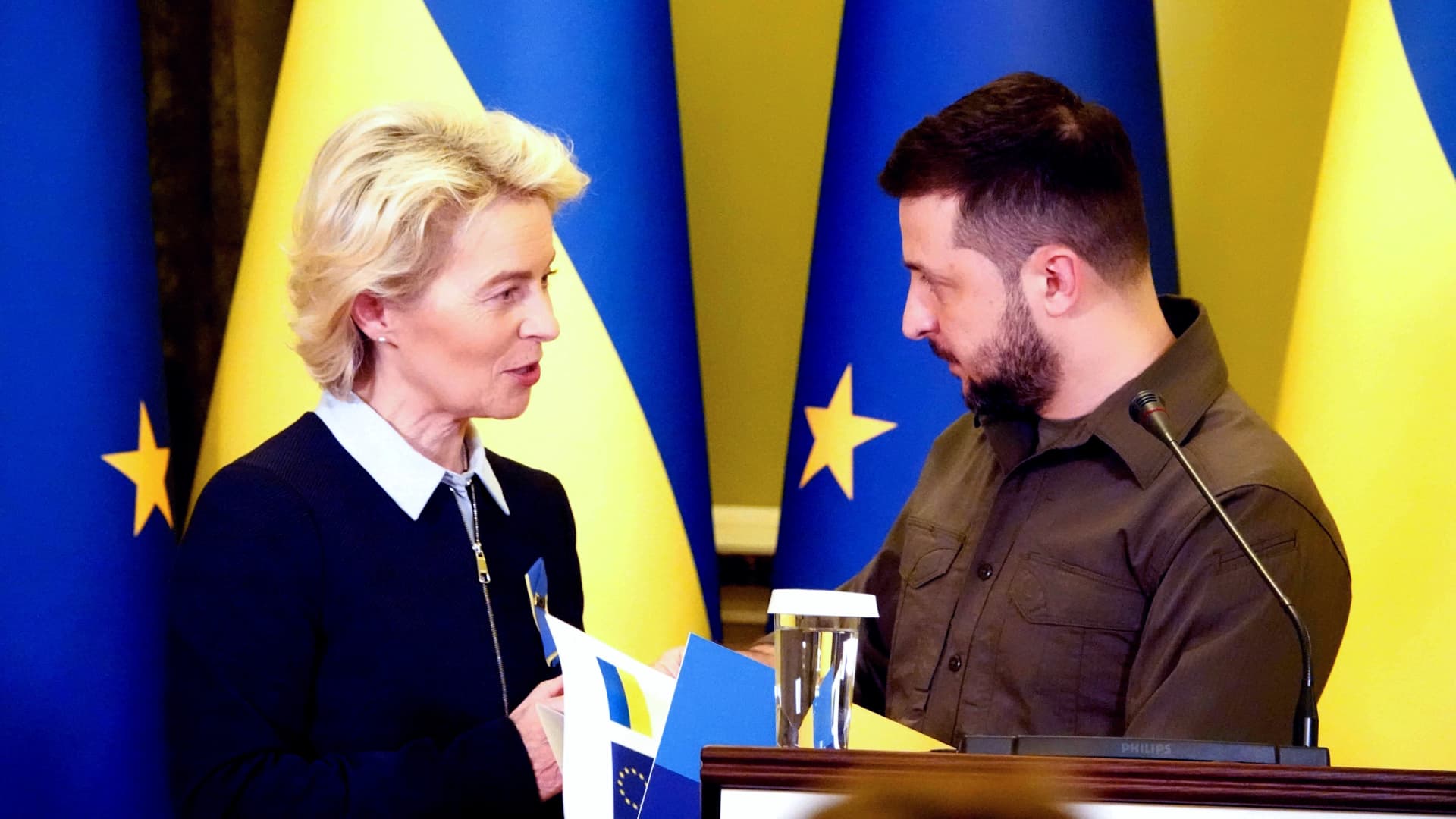EU leaders expected to officially accept Ukraine’s EU candidacy
European Commission President Ursula von der Leyen (l) speaks during a joint press conference with Volodymyr Zelenskyy, President of Ukraine.
Michael Fischer | Image Alliance | Getty Images
BRUSSELS — European Union leaders are expected to formally approve Ukraine’s candidate status to join the bloc on Thursday — the first formal step towards full membership.
This decision has reopened a difficult and delicate debate within the EU on enlargement, as Brussels has not welcomed any new country since 2013, when Croatia joined.
This is partly the result of the bloc’s difficult political and economic environment: the shocks of the 2008 global financial crisis, its own sovereign debt crisis in 2011, and then a wave of refugees from the Syrian civil war in 2015. These events strengthened support for the populists. parties across the region, leading many member states to prioritize domestic issues over EU enlargement.
But that started to change, albeit slowly, after Russia’s unprovoked invasion of Ukraine earlier this year. A recent investigation by the European Parliament revealed that European support for EU membership at 15-year high.
German, French and Italian leaders traveled to Kyiv last week to voice their support for Ukraine’s bid to join the bloc. The European Commission, the executive arm of the EU, then declared that Ukraine and Moldova were ready to move closer to membership, provided they put in place several reforms.
But some EU countries have reservations about reopening the bloc’s doors.
Portuguese Prime Minister Antonio Costa said the EU risked creating “false expectations” with Ukraine’s bid for membership. In a interview with the Financial Timeshe added that the EU should seek to provide immediate support to Kyiv instead of opening “legal discussions”.
Joining the EU is traditionally a lengthy process, as prospective members must align their political and judicial systems with those of the bloc. Moreover, opening the door to one nation could mean opening the door to many others.
Countering Russia
A number of Western Balkan countries, located in southern and eastern Europe, have long been promised EU membership, but negotiations have yet to begin. Kosovo, for example, has been waiting four years for the visa requirement to be lifted to travel to the European Union.
The risk for the EU is that it could be perceived as giving preferential treatment to Kyiv, upsetting other parts of the continent and potentially bringing them closer to Russia.
“We must remain vigilant and give the Western Balkans the same priority as Ukraine,” Austrian ministers Alexander Schallenberg and Karoline Edtstadler said in a letter late last month. “We want and need these countries firmly rooted in our camp.”
For Kosovo, it is a question of geopolitics.
“It is also a question of the EU’s credibility, as well as the EU’s understanding that bringing the Western Balkans together as a region, embracing it and bringing it to table is also a strategic interest of the European Union itself, because, as I said earlier, the more the EU diverts its attention, the more other malicious actors will use this space, mainly Russia”, Kosovo President Vjosa Osmani-Sadriu told CNBC on Wednesday.
His comments should be taken with some caution, however, as Kosovo has a long history of conflict with Serbia, a staunch Russian ally. Kosovo declared independence from Serbia in 2008 and is recognized by 110 countries, including the United States, but not by Serbia and Russia. It has not yet become a UN member state.
EU members Greece, Cyprus and Spain are also among those who do not recognize Kosovo as a sovereign nation, making its possible EU membership highly controversial.
“Now, in light of the Russian invasion of Ukraine, there is nothing more complex and important than fighting autocratic and genocidal regimes, like the Russian regime, because the more Russia has space to expand its influence on the European continent, the more worse it will be for all of us, whether we are inside the EU or outside the Union,” said the President of Kosovo.
The subject will be debated on Thursday between European leaders. Whatever they decide and say to Ukraine, they will be closely watched in the Balkans.
Olaf Scholz, the German Chancellor, told CNBC on Thursday: “[The] the most important issue is that we all work together and that the Western Balkan states will have a good chance of becoming genuine members of the EU. They worked so hard.”
Albania and North Macedonia, which have changed their names to boost their chances of EU membership, had previously been granted candidate country status but are still awaiting the start of accession negotiations.
“It is important to know how leaders explain enlargement to their people,” Osmani-Sadriu said, adding that EU leaders must stress that the bloc’s expansion “is in the interests of peace and of the stability of the whole of the European continent”.


Comments are closed.